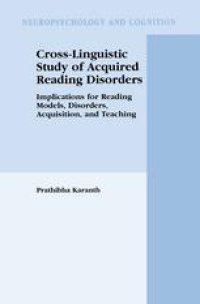
Ebook: Cross-Linguistic Study of Acquired Reading Disorders: Implications for Reading Models, Disorders, Acquisition, and Teaching
Author: Prathibha Karanth (auth.)
- Tags: Child and School Psychology
- Series: Neuropsychology and Cognition 24
- Year: 2003
- Publisher: Springer US
- Edition: 1
- Language: English
- pdf
The acquisition ofreading, the teaching ofreading and the difficulties encountered have been ofsubstantial interest to a wide mnge ofresearchers and practitioners for centuries. Given the increasing centrality ofliteracy in modern life they are now of even greater interest to an ever widening base ofprofessionals. The study of the acquired reading disorders, though in existence for over a century, received enormous impetus with the publication of a seminal paper by Marshall and Newcombe in 1966, leading to neuropsychological model building of reading. Over the last 30 years, within the single case study design there has been extensive and exceedingly fme-gmined research on individuals with acquired disorders ofreading, in an attempt to establish the validity ofthese models ofreading and the human brain. In addition these models have had considerable influence on models of the acquisition ofreading in children and their concomitant difficulties. Much ofthis research has been in readers ofthe alphabetic scripts, particularly the opaque English script. During the last decade or so there has been increasing evidence, particularly in research on reading acquisition, that what is true ofalphabetic scripts like English may not be universally true of all of the scripts of the world. This has led to considerable research into the process of learning to read and write and on the factors affecting reading, which are the touchstone ofthe models, within broader cross-linguistic and cross-cultural perspectives.
The study of acquired reading disorders has served as a touchstone of research on language and the brain. Researchers believe that an in-depth analysis of reading disorders could lead to comprehensive models of the representation of reading skills and its subcomponents in the human brain. Significantly, in the past decade, there has been an increase in the research on learning to read and write and on the factors affecting reading within broader cross-linguistic and cross-cultural perspectives.
This volume focuses on cross-linguistic studies of the acquired disorders of reading and what they can tell us about the models of reading and the human brain. The author has compiled a source-book on cross-linguistic studies of reading disorders with data from the alphasyllabaries of India, in addition to showing the implications of these findings on the understanding of reading, its acquisition, and the developmental and acquired reading disorders and their management.